In this article, let's explore what ERP is and how to implement and apply it in business operations below.
1. What is ERP software?
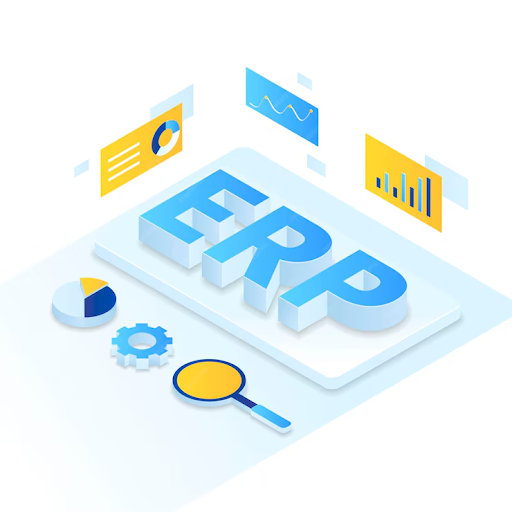
ERP stands for Enterprise Resource Planning, which means an enterprise resource planning system. This is software that integrates core business processes such as finance, sales, inventory management, production management, and human resources into a single platform. It allows businesses to monitor and optimize the entire process from start to finish, creating connectivity and data automation.
Specifically, instead of each department in the company using its own management system, ERP can now integrate data from all departments into a unified management software. The data is entered into the system once and then shared with all relevant departments. This helps reduce data redundancy and duplication, improve operational processes, and increase operational efficiency.
For example, for logistics companies, the implementation of ERP helps businesses effectively manage the entire supply chain, from order receipt, transportation planning, route tracking, to delivery and asset management. The ERP system helps automate processes, reduce errors, and speed up processing. In addition, ERP also provides detailed reports on operational performance, helping businesses evaluate and optimize routes and transportation vehicles, thereby reducing operating costs and improving service quality. Especially, ERP also supports asset management such as vehicles and equipment, helping businesses monitor their condition and plan maintenance and repairs, ensuring continuous and stable operations.
2. Main features of the ERP system
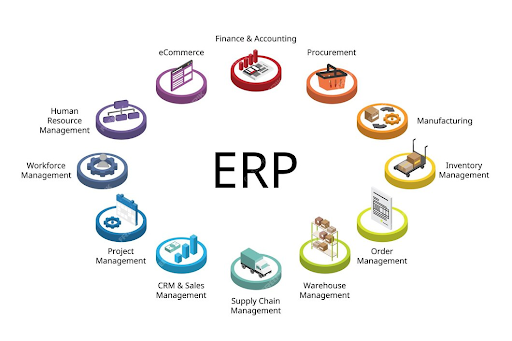
ERP includes many features and different management components with their own purposes and functions. Below, we will list 6 core features of ERP software and how they support businesses in optimizing management processes and providing real-time information.
Financial and Accounting Management
Finance and accounting are among the most important departments in every business. This feature helps businesses manage the ledger and automate important financial tasks. The function of this system is to monitor, store, and analyze various financial factors, including accounts payable (AP), accounts receivable (AR), general ledger (GL), budgeting and forecasting, tracking revenue recognition standards, and mitigating financial risks, among others.With the ability to connect information between departments, ERP allows for the provision of information to other core features to deliver accurate financial information for the business.
Human Resource Management (HRM)
This feature allows for the management of tasks related to human resources, such as recruitment, employee management, performance evaluation, and payroll processing... The main task of HR modules is to track information about benefits, working hours, paid leave, and the number of sick days used, along with other important details such as the duration of social, health, and unemployment insurance contributions of employees. From there, it is possible to manage and monitor employee work performance effectively, making it easier for managers to allocate and optimize the company's human resources.
Supply Chain Management (SCM)
Supply chain management includes all activities related to transforming raw materials into finished products and delivering them to customers. The operation of this system is to create quotation requests, generate contracts, and approve them. Additionally, this feature allows for tracking purchases and home deliveries or managing product returns and replacements. Thanks to this, businesses can minimize under-purchasing and over-purchasing, and improve negotiations with suppliers.
Customer relationship management (CRM)
This feature is responsible for collecting and analyzing information about potential customers, such as contact details, sales history, and service records, in a central database that tracks customer information and purchase history. There are many ERP functions in this section such as order management, contracts, payments, sales performance management, and sales force support. Thanks to CRM, businesses can manage customer information better, develop specific strategies, and enhance their sales teams.
Production Management
Manufacturing enterprises have relatively complex processes; if managed manually, it will be very difficult to control the data. Therefore, the operations of this feature will include material requirements planning (MRP), production planning, production execution, quality management, etc.For example, with the creation of a Bill of Materials (BOM), the ERP system can automatically generate the BOM based on the product design, minimizing errors and the time to transition from the design phase to the production phase. By processing data quickly and in detail, manufacturing businesses will easily track their orders and production processes.
Inventory management
This feature will focus more on helping companies optimize inventory levels and minimize excess. Its main operation will be to control the quantity of items, their locations, and even the performance history of various raw materials or inventory management units (SKUs), providing decision-makers with a more comprehensive view of metrics such as cost of goods sold (COGS), inventory turnover rate, and shrinkage rate. These analyses can support decisions on how to improve inventory performance to increase business profits.
Some other features
The six features mentioned above are commonly found in most ERP systems; however, there are also additional ERP features such as risk management, marketing management, planning capabilities, eCommerce, etc., which are expected to significantly enhance business operations and decision-making capabilities.
3. Characteristics of the ERP management system
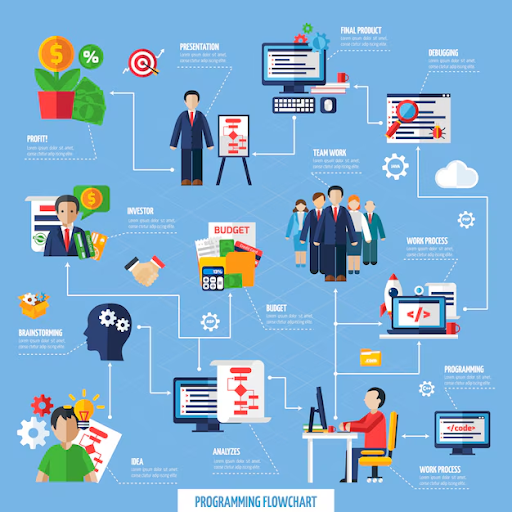
The ERP system has distinct characteristics compared to other enterprise management solutions, which include:
Intuitive interface
ERP is designed with a user-friendly interface, making it easy to use, so that users, even those who are not IT professionals, can quickly familiarize themselves with and use the system.
Intelligent automation
ERP automates repetitive processes, freeing employees from tedious manual tasks. From production planning, inventory management to financial reporting, customer care,... everything is carried out quickly and accurately, minimizing errors and risks to the utmost extent.
Real-time data
ERP builds a centralized data warehouse, helping departments always grasp the latest information about the business situation. Thanks to that, decisions are made more quickly and accurately, based on real data.
Modular design
The functions of the system are implemented separately according to the needs of the business. From there, businesses can use a specially designed ERP system while ensuring security.
Departmental linkage
ERP connects departments within the enterprise, facilitating easy sharing and interaction of information between the units. Thanks to this feature, departments become more interconnected in sharing or tracking work progress and planning departmental activities based on real data.
Flexible adaptation
ERP is not just a rigid software but also has high customization capabilities. You can design and configure the system to fit the workflow and business characteristics of your enterprise.
Comprehensive security
Business information is an invaluable asset. ERP provides various layers of security, helping to protect data from hacker intrusions and other threats.
4. The benefits of ERP software for businesses
The implementation of the ERP system brings many important benefits to the business, helping to optimize operations and enhance business efficiency. Here are some of the most outstanding benefits:
Data integration and synchronization
One of the greatest benefits of ERP is the ability to integrate all business processes into a single system. This helps businesses eliminate data fragmentation and ensures that all departments work on the same database. Thanks to that, important information such as financial reports, inventory status, and customer data are always updated and accurate.
Enhance management capabilities
With administrative features such as inventory management, production management, financial management, and customer management... ERP helps businesses accurately control inventory, plan production efficiently, manage accounting and financial tasks such as payments and financial reporting professionally, manage information as well as customer transaction history, and build sustainable relationships with customers. From there, the business can easily manage the main tasks of the departments in an easy and efficient manner.
Supply chain optimization
With just one click, businesses can track orders from receipt to delivery, ensuring goods arrive at the right place and at the right time. From there, manage supplier information, evaluate cooperation effectiveness, and help select the appropriate supplier. Finally, ERP can forecast customer demand to plan production and procurement accordingly, minimizing inventory costs.
Enhancing decision-making ability
With ERP, managers can access detailed reports and real-time data, enabling them to make more accurate and quicker business decisions. The analysis and forecasting tools in ERP also help businesses predict market trends and optimize resources effectively.
Enhancing security and compliance
Modern ERP systems are equipped with robust security features such as data encryption, user permissions, and multi-factor authentication. This helps businesses protect sensitive information and ensure compliance with data safety regulations as well as legal regulations related to finance and labor.
Easily expand the business model.
When a business expands, the processes will also become more complex. ERP provides a unified platform to manage these processes, helping them operate smoothly and efficiently. ERP can integrate with various systems, such as CRM and SCM, helping businesses comprehensively manage their operations. In addition, ERP provides market analysis tools, helping businesses find new business opportunities and expand their market.
5. Trends in ERP system implementation
When deciding to implement ERP, businesses will face many options regarding the implementation method. Each form has its own advantages and disadvantages, suitable for different types of businesses and specific needs.
Cloud ERP
Cloud ERP is an ERP system hosted and managed on the servers of a cloud service provider. Businesses only need to access the system through a web browser or mobile application. This is the most widely implemented form of ERP application in enterprises due to its low cost, as it does not require investment in hardware and infrastructure.
On-Premise ERP
On-Premise ERP is an ERP system installed directly on the company's server. This ERP solution is suitable for large enterprises that require a complex ERP system and need strict control over their data systems.
Hybrid ERP
Hybrid ERP is a combination of Cloud ERP and On-Premise ERP, allowing businesses to flexibly choose modules or functions deployed in the cloud or on-site. This form is suitable for businesses that want to implement modularization according to their own business model.
6. Which businesses should consider using ERP software?
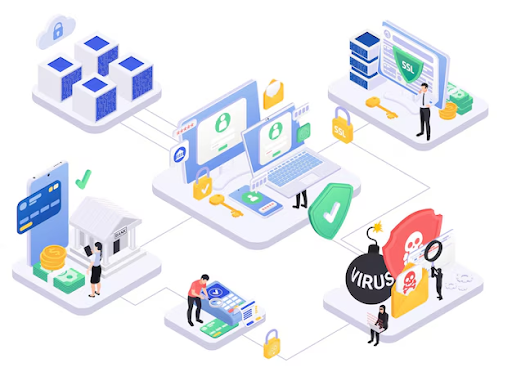
Manufacturing enterprise
With modules such as creating product catalogs, tracking, order notes, price lists, and other important features in managing the production process...Thanks to its ability to accurately plan production and manage materials efficiently, ERP helps reduce the situation of overproduction, underproduction, or defective products, thereby minimizing waste, improving product quality, and ensuring timely delivery.
Retail businesses
With ERP, retail businesses can easily manage inventory by continuously updating the stock levels at stores and warehouses, helping to avoid stock shortages or excessive inventory.Based on historical sales data, ERP can forecast customer demand, helping businesses plan appropriate inventory procurement. From there, grasp consumer trends and personalize the shopping experience for customers.
Service trade enterprises
ERP plays a crucial role as a powerful tool, helping service enterprises plan, monitor, and manage projects closely, from the stage of receiving customer requests to completion and handover. By integrating related processes, ERP helps businesses ensure consistent service quality, enhance customer satisfaction, and build brand loyalty.
Businesses want to optimize processes
ERP is the "golden key" to optimizing workflows. By automating repetitive tasks, ERP helps businesses reduce processing time, increase labor productivity, and improve operational efficiency. At the same time, ERP also provides detailed reports, helping businesses evaluate work efficiency and make informed business decisions.
The business is expanding its scale
When a business scales up, managing business operations becomes more complex. ERP with the ability to integrate customer management, human resources, finance, and accounting features will be the optimal solution. This system helps businesses closely monitor operational performance, make data-driven business decisions, and supports businesses in adapting to rapid growth. For example, through the customer management module, businesses can build effective marketing campaigns, thereby increasing revenue and expanding the market.
Multinational enterprises
ERP is the "bridge" that helps multinational enterprises unify data and processes, ensuring smooth and efficient business operations globally. Especially, this big data information will be secured and flexibly connect departments, making remote management between countries easier. Just one click, and you can track information within the same system.
And some businesses in other sectors such as: Real estate and construction, Transport – Logistics, Pharmaceuticals, Education…
The implementation of an ERP system is an important strategic decision for the business. To ensure success, businesses need to conduct a thorough evaluation of factors such as scale, industry, financial capacity, current processes, and business objectives. A suitable ERP system not only helps optimize processes and enhance performance but also serves as a solid foundation for the sustainable development of the enterprise.
7. The difficulties when businesses switch to using an ERP system
Switching to ERP software is an important decision, especially when businesses are already accustomed to traditional processes and tools. Below are some common challenges businesses face when they need to use an ERP system:
The investment cost is quite high.
For large-scale enterprises, the cost of purchasing licenses, customizing, and upgrading software is very high because it requires investment in infrastructure and security networks to meet business needs. In addition, the cost of training employees to familiarize themselves with the system also requires the business to review and adjust.
The implementation process is complex and time-consuming.
Deploying complex ERP systems takes quite a long time because the process of transferring old data to the new system requires significant time and effort. The project may take years to complete and will continuously require improvements and adjustments to fit the scale of the business. This can affect the business's operational processes if there are no reasonable implementation plans.
Difficulty in choosing a software provider
With the two reasons above, choosing a reputable software provider is extremely important. Currently, there are many ERP software providers on the market with different prices and features. Evaluating and comparing ERP solutions requires specialized knowledge and experience.
Difficulty in getting used to the new work process
Companies that have a familiar workflow with traditional tools will find it very difficult to change user habits. Employees may find it difficult to adapt to the new system and new working procedures. If there is no thorough preparation, changing the workflow can cause chaos and reduce operational efficiency.
8. Criteria that help businesses own a good ERP management software?
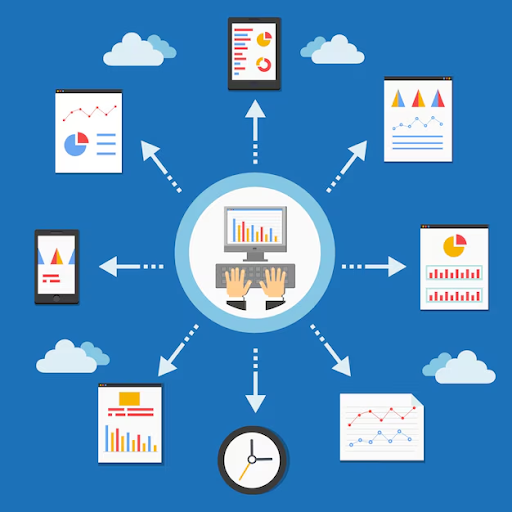
Understanding the difficulties and challenges in selecting an ERP software provider, we suggest some criteria to help your business acquire a good ERP software:
- The intuitive and unified interface helps users easily familiarize themselves and use it.
- Provide comprehensive costs with a reasonable pricing structure, including initial investment, maintenance, and support.
- Automating daily tasks helps free up employees and increase work productivity.
- Seamlessly integrate business production processes and work operation processes.
- Automate and optimize repetitive departmental tasks.
- Data security is the top priority, ensuring information safety for the business.
- Choosing a place that provides professional support helps ensure a smooth deployment and operation process.Please provide the text you would like me to translate.
- The method of implementing ERP suitable for the current situation of the business
9. Sota Solutions accompanies businesses in effectively implementing ERP.
Sota Solutions is a member of Sota Holdings, a leading provider of ERP enterprise management solutions in Vietnam, and a reputable partner of top global ERP system providers such as Odoo, Epicor, Salesforce...The Sota Solutions team is led by top experts with experience in various fields, especially with major Japanese manufacturers in Vietnam and the Vietnamese government.
The ERP integration system of Sota Solutions has the following advantages:
All-in-one management software
Sota Solutions provides a seamless synchronization solution on a single platform, designed and developed based on flexible customization to suit the scale of businesses and industry characteristics.
The interface is visually appealing and user-friendly
The beautiful and user-friendly interface allows all users to operate the system without any difficulties. Sota Solutions prioritizes user experience above all.
Reliable team
The team at Sota Solutions is led by top experts with many years of experience working with global clients, including several major Japanese manufacturers and the Vietnamese government. We excel in consulting, analyzing business requirements, and developing and integrating systems to meet customer needs.
Low cost, quick deployment, high efficiency
Sota Solutions deploys standard ERP modules online (on cloud servers) to allow you to use our ERP immediately, saving on investment costs, with monthly service fee payments. As per our slogan: "You focus on business operations, we focus on technology."
Sota Solutions understands the difficulties and obstacles that businesses face when seeking optimal business management solutions. Sota Solutions hopes that with the information provided above, you have gained a basic understanding of the ERP system.
Conclusion
In summary, ERP is a powerful tool that helps businesses optimize processes, enhance operational efficiency, and make informed business decisions. However, to fully leverage the benefits of ERP, selecting and implementing the appropriate system is extremely important. When deciding to invest in ERP, businesses need to carefully consider the scale, industry, business objectives, and budget to find the most suitable solution. If you are looking to learn more about ERP and want to know how it can help your business grow, please contact us for detailed advice.